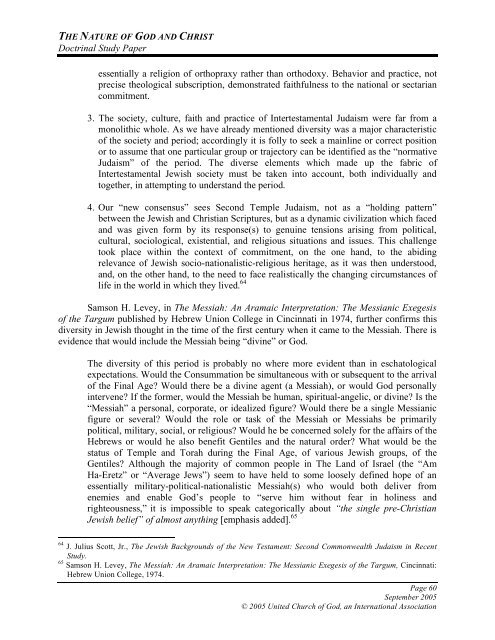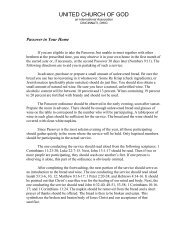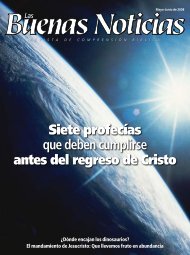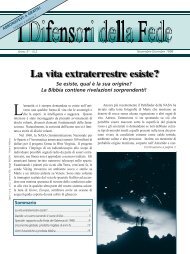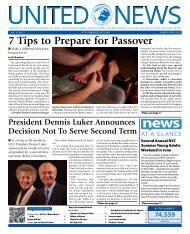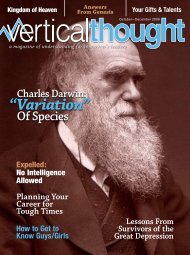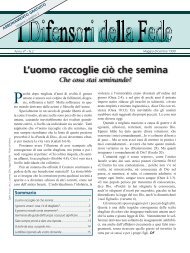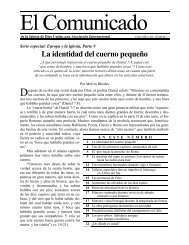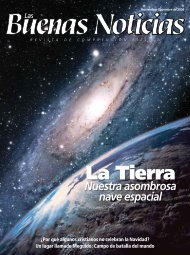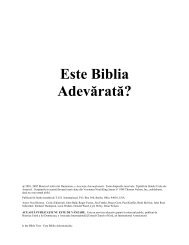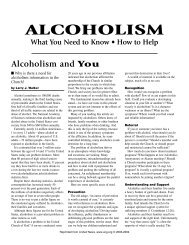The Nature of God and Christ - Members Site - United Church of God
The Nature of God and Christ - Members Site - United Church of God
The Nature of God and Christ - Members Site - United Church of God
- No tags were found...
You also want an ePaper? Increase the reach of your titles
YUMPU automatically turns print PDFs into web optimized ePapers that Google loves.
THE NATURE OF GOD AND CHRISTDoctrinal Study Paperessentially a religion <strong>of</strong> orthopraxy rather than orthodoxy. Behavior <strong>and</strong> practice, notprecise theological subscription, demonstrated faithfulness to the national or sectariancommitment.3. <strong>The</strong> society, culture, faith <strong>and</strong> practice <strong>of</strong> Intertestamental Judaism were far from amonolithic whole. As we have already mentioned diversity was a major characteristic<strong>of</strong> the society <strong>and</strong> period; accordingly it is folly to seek a mainline or correct positionor to assume that one particular group or trajectory can be identified as the “normativeJudaism” <strong>of</strong> the period. <strong>The</strong> diverse elements which made up the fabric <strong>of</strong>Intertestamental Jewish society must be taken into account, both individually <strong>and</strong>together, in attempting to underst<strong>and</strong> the period.4. Our “new consensus” sees Second Temple Judaism, not as a “holding pattern”between the Jewish <strong>and</strong> <strong>Christ</strong>ian Scriptures, but as a dynamic civilization which faced<strong>and</strong> was given form by its response(s) to genuine tensions arising from political,cultural, sociological, existential, <strong>and</strong> religious situations <strong>and</strong> issues. This challengetook place within the context <strong>of</strong> commitment, on the one h<strong>and</strong>, to the abidingrelevance <strong>of</strong> Jewish socio-nationalistic-religious heritage, as it was then understood,<strong>and</strong>, on the other h<strong>and</strong>, to the need to face realistically the changing circumstances <strong>of</strong>life in the world in which they lived. 64Samson H. Levey, in <strong>The</strong> Messiah: An Aramaic Interpretation: <strong>The</strong> Messianic Exegesis<strong>of</strong> the Targum published by Hebrew Union College in Cincinnati in 1974, further confirms thisdiversity in Jewish thought in the time <strong>of</strong> the first century when it came to the Messiah. <strong>The</strong>re isevidence that would include the Messiah being “divine” or <strong>God</strong>.<strong>The</strong> diversity <strong>of</strong> this period is probably no where more evident than in eschatologicalexpectations. Would the Consummation be simultaneous with or subsequent to the arrival<strong>of</strong> the Final Age? Would there be a divine agent (a Messiah), or would <strong>God</strong> personallyintervene? If the former, would the Messiah be human, spiritual-angelic, or divine? Is the“Messiah” a personal, corporate, or idealized figure? Would there be a single Messianicfigure or several? Would the role or task <strong>of</strong> the Messiah or Messiahs be primarilypolitical, military, social, or religious? Would he be concerned solely for the affairs <strong>of</strong> theHebrews or would he also benefit Gentiles <strong>and</strong> the natural order? What would be thestatus <strong>of</strong> Temple <strong>and</strong> Torah during the Final Age, <strong>of</strong> various Jewish groups, <strong>of</strong> theGentiles? Although the majority <strong>of</strong> common people in <strong>The</strong> L<strong>and</strong> <strong>of</strong> Israel (the “AmHa-Eretz” or “Average Jews”) seem to have held to some loosely defined hope <strong>of</strong> anessentially military-political-nationalistic Messiah(s) who would both deliver fromenemies <strong>and</strong> enable <strong>God</strong>’s people to “serve him without fear in holiness <strong>and</strong>righteousness,” it is impossible to speak categorically about “the single pre-<strong>Christ</strong>ianJewish belief” <strong>of</strong> almost anything [emphasis added]. 6564 J. Julius Scott, Jr., <strong>The</strong> Jewish Backgrounds <strong>of</strong> the New Testament: Second Commonwealth Judaism in RecentStudy.65 Samson H. Levey, <strong>The</strong> Messiah: An Aramaic Interpretation: <strong>The</strong> Messianic Exegesis <strong>of</strong> the Targum, Cincinnati:Hebrew Union College, 1974.Page 60September 2005© 2005 <strong>United</strong> <strong>Church</strong> <strong>of</strong> <strong>God</strong>, an International Association


